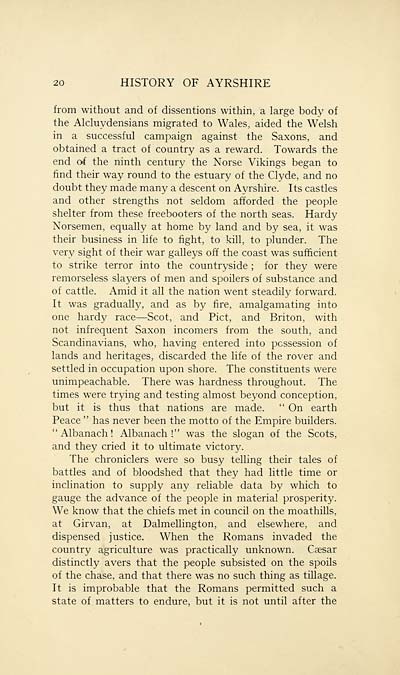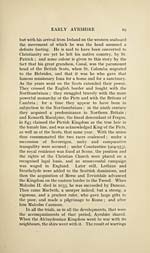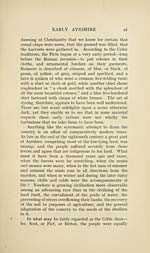Download files
Complete book:
Individual page:
Thumbnail gallery: Grid view | List view

20 HISTORY OF AYRSHIRE
from without and of dissentions within, a large body of
the Alcluydensians migrated to Wales, aided the Welsh
in a successful campaign against the Saxons, and
obtained a tract of country as a reward. Towards the
end oi the ninth century the Norse Vikings began to
find their way round to the estuary of the Clyde, and no
doubt they made many a descent on Ayrshire. Its castles
and other strengths not seldom afforded the people
shelter from these freebooters of the north seas. Hardy
Norsemen, equally at home by land and by sea, it was
their business in life to fight, to kill, to plunder. The
very sight of their war galleys off the coast was sufficient
to strike terror into the countryside ; for they were
remorseless slayers of men and spoilers of substance and
of cattle. Amid it all the nation went steadily forward.
It was gradually, and as by fire, amalgamating into
one hardy race — Scot, and Pict, and Briton, with
not infrequent Saxon incomers from the south, and
Scandinavians, who, having entered into possession of
lands and heritages, discarded the life of the rover and
settled in occupation upon shore. The constituents were
unimpeachable. There was hardness throughout. The
times were trying and testing almost beyond conception,
but it is thus that nations are made. " On earth
Peace " has never been the motto of the Empire builders.
"Albanach! Albanach !" was the slogan of the Scots,
and they cried it to ultimate victory.
The chroniclers were so busy telling their tales of
battles and of bloodshed that they had little time or
inclination to supply any reliable data by which to
gauge the advance of the people in material prosperity.
We know that the chiefs met in council on the moathills,
at Girvan, at Dalmellington, and elsewhere, and
dispensed justice. When the Romans invaded the
country agriculture was practically unknown. Caesar
distinctly avers that the people subsisted on the spoils
of the chase, and that there was no such thing as tillage.
It is improbable that the Romans permitted such a
state of matters to endure, but it is not until after the
from without and of dissentions within, a large body of
the Alcluydensians migrated to Wales, aided the Welsh
in a successful campaign against the Saxons, and
obtained a tract of country as a reward. Towards the
end oi the ninth century the Norse Vikings began to
find their way round to the estuary of the Clyde, and no
doubt they made many a descent on Ayrshire. Its castles
and other strengths not seldom afforded the people
shelter from these freebooters of the north seas. Hardy
Norsemen, equally at home by land and by sea, it was
their business in life to fight, to kill, to plunder. The
very sight of their war galleys off the coast was sufficient
to strike terror into the countryside ; for they were
remorseless slayers of men and spoilers of substance and
of cattle. Amid it all the nation went steadily forward.
It was gradually, and as by fire, amalgamating into
one hardy race — Scot, and Pict, and Briton, with
not infrequent Saxon incomers from the south, and
Scandinavians, who, having entered into possession of
lands and heritages, discarded the life of the rover and
settled in occupation upon shore. The constituents were
unimpeachable. There was hardness throughout. The
times were trying and testing almost beyond conception,
but it is thus that nations are made. " On earth
Peace " has never been the motto of the Empire builders.
"Albanach! Albanach !" was the slogan of the Scots,
and they cried it to ultimate victory.
The chroniclers were so busy telling their tales of
battles and of bloodshed that they had little time or
inclination to supply any reliable data by which to
gauge the advance of the people in material prosperity.
We know that the chiefs met in council on the moathills,
at Girvan, at Dalmellington, and elsewhere, and
dispensed justice. When the Romans invaded the
country agriculture was practically unknown. Caesar
distinctly avers that the people subsisted on the spoils
of the chase, and that there was no such thing as tillage.
It is improbable that the Romans permitted such a
state of matters to endure, but it is not until after the
Set display mode to:
![]() Universal Viewer |
Universal Viewer | ![]() Mirador |
Large image | Transcription
Mirador |
Large image | Transcription
Images and transcriptions on this page, including medium image downloads, may be used under the Creative Commons Attribution 4.0 International Licence unless otherwise stated. ![]()
| Histories of Scottish families > Ayrshire > Volume 1 > (30) Page 20 |
|---|
| Permanent URL | https://digital.nls.uk/95194646 |
|---|
| Attribution and copyright: |
|
|---|
| Description | A selection of almost 400 printed items relating to the history of Scottish families, mostly dating from the 19th and early 20th centuries. Includes memoirs, genealogies and clan histories, with a few produced by emigrant families. The earliest family history goes back to AD 916. |
|---|

